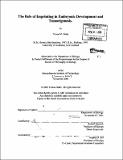| dc.contributor.advisor | Rudolph Jaenisch. | en_US |
| dc.contributor.author | Holm, Teresa M | en_US |
| dc.contributor.other | Massachusetts Institute of Technology. Dept. of Biology. | en_US |
| dc.date.accessioned | 2008-02-12T16:49:22Z | |
| dc.date.available | 2008-02-12T16:49:22Z | |
| dc.date.copyright | 2005 | en_US |
| dc.date.issued | 2006 | en_US |
| dc.identifier.uri | http://dspace.mit.edu/handle/1721.1/34187 | en_US |
| dc.identifier.uri | http://hdl.handle.net/1721.1/34187 | |
| dc.description | Thesis (Ph. D.)--Massachusetts Institute of Technology, Dept. of Biology, February 2006. | en_US |
| dc.description | Includes bibliographical references (v. 2, leaves 150-197). | en_US |
| dc.description.abstract | Imprinting is a mammalian adaptation that results in the mono-allelic expression of a subset of genes depending on their parental origin. It is believed that DNA methylation marks are responsible for maintaining imprinted gene expression patterns. The 'parental conflict' hypothesis was proposed to explain the evolution of imprinting and is based on the assumption that mammals arose from an ancestor that was polyandrous (multiple fathers within one litter). According to this hypothesis, conflict between the male and female over the allocation of maternal resources to the offspring led to the evolution of imprinting. Consistent with this, many imprinted genes are involved in embryonic or placental growth by regulating mitogenic pathways or the cell cycle. Loss of imprinting (LOI) has been found at specific loci in cancers, raising the possibility that altered expression of imprinted genes may also contribute to tumorigenesis. To investigate the effect of global LOI on embryonic development and cancer formation, imprint free (IF) embryonic stem (ES) cells were generated using conditional inactivation/reactivation of the DNA methyltransferase Dnmtl. Tetraploid complementation and chimera experiments revealed that IF-embryos fail to develop beyond E11.5 and display an overgrowth phenotype. | en_US |
| dc.description.abstract | (cont.) As developmental comparisons, parthenogenetic and androgenetic (AT) embryos were derived and found to develop to E9.5 and E7.5, respectively. Removing the imprinted methyl marks from AT-ES cells rescued embryonic development to E9.5-10.5 and restored pluripotency. However, IFAT embryos were not developmentally equivalent to biparentally-derived IF-embryos, suggesting that mechanisms other than DNA methylation may be involved in maintaining parent-specific gene expression patterns. To study the effect of LOI on cell growth, murine embryonic fibroblasts (MEFs) were derived from E13.5 chimeric IF-embryos and analyzed in vitro. IF-MEFs grew faster, were resistant to the cytostatic effects of TGFI3, and formed tumors in SCID mice. In addition, IF-MEFs were immortal and when exposed to H-Ras became fully transformed. Western blot analysis of IF-MEFs revealed abnormally low levels of p19Arf and p53, two critical regulators of growth arrest and potent tumor suppressors. Somatic contribution of IF-ES cells in chimeric adults led to highly penetrant tumor formation by 12 months of age, causing multiple cancer types derived from the IF cells. Taken together, these data are consistent with global LOI having a causal role in tumorigenesis by affecting the regulation of the p53-p19Ar pathway and predisposing IF cells to transformation. | en_US |
| dc.description.statementofresponsibility | by Teresa M. Holm. | en_US |
| dc.format.extent | 2 v. (200 leaves) | en_US |
| dc.language.iso | eng | en_US |
| dc.publisher | Massachusetts Institute of Technology | en_US |
| dc.rights | M.I.T. theses are protected by copyright. They may be viewed from this source for any purpose, but reproduction or distribution in any format is prohibited without written permission. See provided URL for inquiries about permission. | en_US |
| dc.rights.uri | http://dspace.mit.edu/handle/1721.1/34187 | en_US |
| dc.rights.uri | http://dspace.mit.edu/handle/1721.1/7582 | |
| dc.subject | Biology. | en_US |
| dc.title | The role of imprinting in embryonic development and tumorigenesis | en_US |
| dc.type | Thesis | en_US |
| dc.description.degree | Ph.D. | en_US |
| dc.contributor.department | Massachusetts Institute of Technology. Department of Biology | |
| dc.identifier.oclc | 69650287 | en_US |
